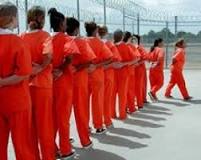
In America’s capital, juveniles in the criminal justice system are treated badly. Federal prosecutors in Washington, DC have “unfettered discretion” to send youth to adult court and correctional facilities, and they often do.
Take Alisha, for example, who was tried and charged as an adult in DC Superior Court when she was only 16 years old. She was sent to DC’s Correctional Treatment Facility (CTF). There are no special units for female youth at CTF, so Alisha was sent to solitary confinement. For weeks at a time, she was on lockdown for 23 hours a day, was unable to attend school, and could not participate in any programming available at the jail. Her attorney fought to move her to a more appropriate place that could also address her mental health concerns, but she remained here for a year and a half. Understandably, Alisha was depressed as lonely. In solitary confinement, she attempted suicide.
Alisha is not alone. “Youth who are incarcerated in adult facilities are 36 times more likely to commit suicide than their peers in juvenile facilities,” according to Carmen Daugherty, Policy Director at Campaign for Youth Justice. They are also much likelier to be physically and sexually assaulted. “The adult system is no place for kids,” Daugherty declared.
A May 2014 report by DC Lawyers for Youth and Campaign for Youth Justice stated that “incarcerating youth in the adult system is developmentally inappropriate, unsafe, and does not decrease recidivism.” In fact, the report found that trying youth in the adult system actually increases recidivism.
DC is a particularly bad place for juveniles, as the report shows. A criminal justice consulting firm assessed the Juvenile Unit at CTF in 2013. They found that: “1) the facility space is too limited to provide adequate programming or sufficient physical activity, 2) most youth are not able to have in-person visitation with their family members, 3) some staff working the unit are inadequately trained to address the needs of youth, and 4) the amount of structured programming offered to youth is inadequate.” Yet, children continue to be sentenced here.
Who are the youth most affected by DC’s current practices? Disproportionately, they come from the most under-resourced neighborhoods in the district: low-income communities of color. A staggering 97% of the youth incarcerated at CTF between 2007 and 2012 were African American and 3% were Latino. Almost all of them come from the eastern half of the district or identified as homeless.
Twenty-three states have taken steps to decrease reliance on the adult justice systems in youth cases. Yet, the nation’s capital continues to prosecute youth as adults. Public policy in Washington, DC needs to change.
This Wednesday, November 12, the DC Council’s Judiciary Committee is voting on The Youth Offender Accountability and Rehabilitation Act of 2014 (Bill 20-825). YOARA would keep teenagers awaiting trial out of adult jails, keep more juvenile cases in family court, and end the practice of “once an adult, always an adult,” which allows teens’ prior offenses to be used against them. Contact DC Councilmembers and urge them to pass YOARA here!
(Photo Credit: African Globe)